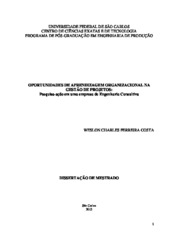Oportunidades de aprendizagem organizacional na gestão de projetos: pesquisa-ação em uma empresa de engenharia consultiva
Abstract
In recent years the possibility of incorporating the process of Learning Organizational (LO) during the life cycle of projects has been drawing the attention of scholars. However, there are few studies that analyze the subject in a practical and deeper way. The traditional studies try to consider and discuss the learning after the project more accurately due to its wide use in the business world. Nevertheless, the learning process may also occur during the projects when stimulated by mechanisms that systematize the externalization of knowledge and by means that encourage the sharing and the transference of them between projects team. Structured by means of a research action, this dissertation collaborate with the expansion of the knowledge about the subject investigating and improving actions that promote the practice of learning organizational during the development of projects in a medium-sized Consulting Engineering company from the civil construction sector located in the metropolitan region of São Paulo. The actions are guided aiming to promote the transference of explicit knowledge (technical documents and reports), the reuse of the learning from their own experiences and past history (tacit knowledge) and the systematic problem solving. The implemented actions were incorporated in the procedures of the Quality Management System of the Company and, from trainings, observations and informal and formal evaluations (internal and external audits) it was possible to point opportunities of improvements to reinforce the process of organizational learning during the development of projects. The research revealed that the transference of knowledge generated in documents, reports and technical studies to other projects is not effective in organizational level, being a lot more employed among the project coordinators with more length of service that know a larger number of projects performed or ongoing. In the other hand, despite the tacit experiences developed by the people (own experiences), the learning occurs when the coordinator of a project compulsorily identifies and registers in a Project Execution Plan (PEP) the similar developed or developing contracts in the company, interrelating them with the people involved in these contracts. Following the process, the plan is disclosed to the team members of this coordinator, which consult those people. The generation of knowledge provided by the dynamic of systematic problem solving appears as incipient because, in the consulting engineering, a lot of factors hinder the capture of this knowledge in the form of register for later reuse. Among these factors it is possible to mention: difficulty in determining the categories of problems that comprehend all the projects, imposition of the clients not to generate registers, hesitancy of the project coordinators to externalize the problems of the projects and, as a result, their reputations.
